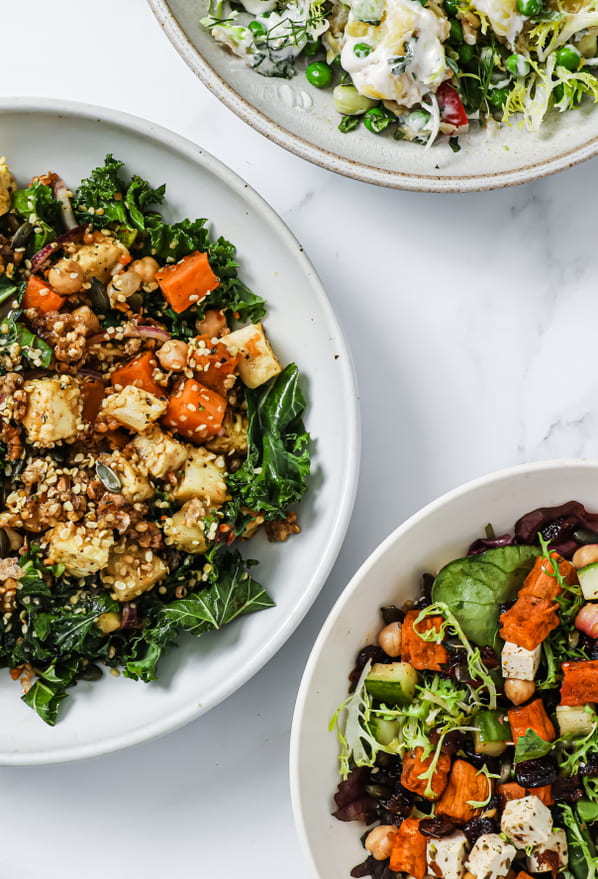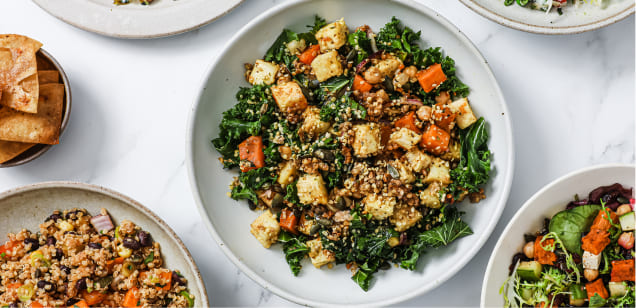Foundations of healthy plant-based eating
Eating a nutritionally complete, well-balanced diet is one of the most important things we can do to ensure a long, prosperous, and healthy life.
Healthy eating is proven to help lower your risk of heart disease and stroke by (1):
- Helping to manage body weight
- Improving cholesterol levels
- Reducing blood pressure
- Controlling blood sugar levels
What does healthy eating look like?
1) Eat plenty of fruit and vegetables
Fruit and vegetables are typically low in fat and calories (provided they are not fried or cooked in lots of oil), so eating them can help you manage your weight. They're also an excellent source of dietary fibre, which helps to maintain a healthy gut and prevent constipation and other digestion problems (2). Aim to consume a wide variety as different fruits and vegetables contain different combinations of essential nutrients and minerals. A good rule of thumb to follow when serving your food is to fill half of your plate with fruit and vegetables for each meal (1).
2) Choose whole-grain foods
Whole-grain foods are packed with fibre, protein, and B vitamins to help keep you feeling fuller and satisfied for longer – which makes it easier to maintain healthy body weight (1). Whole grains are also linked to a lower risk of heart disease, diabetes, certain cancers, and other health problems (3). Whole-grain foods include things like whole-wheat bread and pasta, quinoa, brown or wild rice, and oatmeal. Choose whole grain options over highly processed or refined food like white bread and yellow pasta, which have a higher sugar and salt content. Aim to fill a quarter of your plate with whole-grain foods (1).
3) Consume protein-based foods
Proteins are made up of chemical 'building blocks' called amino acids. Your body uses amino acids to build and repair muscles and bones, as well as to make hormones and enzymes (4). This means protein is great for building and maintaining strong bones, muscles, and skin. Shortly after exercising, it’s recommended that you consume a serving of high-quality protein with a carbohydrate meal to help maintain your body’s protein balance (4). Protein foods include things like beans, legumes, tofu, peanut butter, nuts, and seeds. Aim to fill that final quarter of your plate with high-quality protein-based foods (1).
4) Limit highly processed foods
Processed foods are those that are altered from their original food source in some way and have additional added ingredients. During processing, important nutrients such as vitamins, minerals, and fibre are removed while salt and sugar are added (1). Common processed foods include all forms of fast foods, breakfast cereals, white bread, and ready meals. However, not all processed foods are unhealthy – there are many minimally processed foods that still keep almost all of their essential nutrients (5). These include tofu, frozen vegetables and fruit, brown rice, and dried herbs.
5) Make water your drink of choice
Over 60% of our body weight is made up of water. Our bodies use water in cells, organs, and tissues, to help regulate body temperature and maintain other bodily functions. Because our bodies lose water through breathing, sweating, and digestion, it's important to rehydrate regularly and eat food with a high-water content – such as fruit and veg (6). Avoid fruit juice, as although it contains some vitamins and minerals, it has more sugar than the fruit itself and less fibre. Fruit juices and sugary drinks make it easy to consume empty calories without realising, and this can lead to weight gain (7). So, stick with a trusted glass of water, because it is the best way to hydrate without adding any calories to your diet.
At Holy, we know exactly what makes people feel and look their best: nutritionally complete, plant-based meals. So, sit back and take the guesswork out of your meal planning. Our nutritionists and chefs have carefully and precisely created a nutrient-dense vegan menu. Every forkful that enters your mouth will be packed full of all the vitamins and minerals you need to thrive. It’s time to unleash the power of food with Holy! Find out more here.
References
- Heart & Stroke Canada. Healthy eating basics. [Online]. Available at: https://www.heartandstroke.ca/healthy-living/healthy-eating/healthy-eating-basics
- NHS. (2018) Why 5 A Day? [Online]. Available at: https://www.nhs.uk/live-well/eat-well/why-5-a-day/
- Mayo Clinic. (2020). Healthy Lifestyle: Nutrition and Healthy Eating. [Online]. Available at: https://www.mayoclinic.org/healthy-lifestyle/nutrition-and-healthy-eating/in-depth/whole-grains/art-20047826
- Better Health. (2020). Healthy Eating: Protein. [Online]. Available at: https://www.betterhealth.vic.gov.au/health/healthyliving/protein#getting-more-protein-into-your-day-naturally
- NHS. (2020). Eating processed foods. [Online]. Available at: https://www.nhs.uk/live-well/eat-well/what-are-processed-foods/
- IHHC. (2019). The importance of water in our daily lives. [Online]. Available at: https://www.indiahomehealthcare.com/blogpost/the-importance-of-water-in-our-daily-lives/
- Harvard School of Public Health. The importance of hydration. [Online]. Available at: https://www.hsph.harvard.edu/news/hsph-in-the-news/the-importance-of-hydration/



